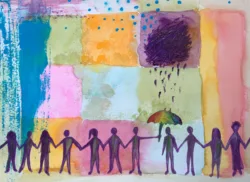Mental Health and the LGBTQ+ Community

Members of the LGBTQ+ community face unique socioeconomic and cultural challenges that can put them at a higher risk of developing mental health issues, like depression, post-traumatic stress disorder (PTSD), anxiety, substance use and self-destructive behaviors.
In case you aren’t sure exactly what LGBTQ+ means, it’s an umbrella term that includes groups of people who identify as lesbian, gay, bisexual, transgender, queer and/or questioning. According to the nonprofit organization Mental Health America, about 4.5 percent of the overall population identifies as LGBTQ+.
Unfortunately, LGBTQ+ people are often targets of prejudice, discrimination, harassment and denial of civil and human rights, all of which can worsen existing mental health conditions as well as lead to the development of new symptoms.
All humans desire acceptance and belonging, so rejection from family, friends and peers because of sexual orientation or gender identity can also negatively affect one’s mental health. Current data confirms this, with nearly 5.8 million LGBTQ+ people, or 39 percent, reporting that they suffer from a mental illness.
LGBTQ+ mental health statistics
Research studies specific to this community tend to be limited because large-scale clinical trials in behavioral health often don’t include the full range of gender identities and sexual orientations. However, the data we do have are alarming.
Here’s what we know about LGBTQ+ mental health:
- Lesbian, gay and bisexual adults are twice as likely to have a mental health condition when compared with heterosexual adults
- Transgender adults are four times as likely as cisgender individuals to suffer from a mental illness
- LGBTQ+ individuals are three times as likely as heterosexual individuals to have a mental health disorder
- LGBTQ+ teens are around six times more likely than their heterosexual, cisgender peers to experience symptoms of depression
- Young LGBTQ+ people are more than twice as likely to experience suicidal thoughts and behaviors
- Among transgender adults, 48 percent say that they have considered suicide in the last year, compared with 4 percent in the overall population
In addition to a higher risk of mental health disorders, the LGBTQ+ community may be more prone to substance abuse. Discrimination is highly associated with substance use disorders in this community.
Here are some quick facts about LGBTQ+ people and substance use:
- Opioid use is 9 percent in LGBTQ+ adults compared with 3.8 percent in the overall population
- Lesbian or gay people are more than twice as likely as heterosexual people to have a severe alcohol use disorder, while bisexual people are more than three times as likely
- Transgender youths are about 2.5 times more likely than cisgender peers to use drugs like methamphetamines and cocaine
- LGBTQ+ people with substance use disorders are more likely to suffer from an additional co-occurring mental health disorder
These disparities are confounded by the fact that finding help can be a challenge for sexual and gender minorities. Social stigma and negative past experiences may dissuade LGBTQ+ individuals from seeking help.
Discrimination against LGBTQ+ in healthcare
Unfortunately, when LGBTQ+ persons are struggling with their mental health does decide to pursue treatment, research suggests that they may face discrimination or even abuse from practitioners. In 2016, the National Institute on Minority Health and Health Disparities identified the LGBTQ+ community as a “health disparity population.” This means that access to care is restricted to members of the community, who also tend to suffer from higher burdens of some diseases, including mental illnesses and addiction.
About 8 percent of LGBTQ+ people and 27 percent of transgender people say they have been denied necessary medical care. In addition, there is evidence that personal bias as well as a lack of understanding and cultural sensitivity among clinicians mean that LGBTQ+ individuals may receive less effective care.
More than half of LGBTQ+ people who responded to a survey claim to have experienced denial of care, harsh language from a provider or a clinician blaming their LGBTQ+ status as the cause of an illness. Fear of this kind of mistreatment and discrimination can cause some LGBTQ+ people to conceal their sexual orientation or gender identity from their doctor (which can also worsen the quality of care), or simply avoid seeking care at all.
LGBTQ+ mental health resources
Providing treatment for mental health disorders that is in full alignment with the unique needs of the LGBTQ+ population is essential. Pyramid Healthcare’s licensed staff members are committed to offering LGBTQ+ people a welcoming, safe environment for recovery and personal growth. Our approach focuses on helping LGBTQ+ individuals develop strategies to embrace their identity, empower themselves and find acceptance.
Contact us today to learn more about our offerings.
Members of the LGBTQ+ community face unique socioeconomic and cultural challenges that can put them at a higher risk of developing mental health issues, like depression, post-traumatic stress disorder (PTSD), anxiety, substance use and self-destructive behaviors.
In case you aren’t sure exactly what LGBTQ+ means, it’s an umbrella term that includes groups of people who identify as lesbian, gay, bisexual, transgender, queer and/or questioning. According to the nonprofit organization Mental Health America, about 4.5 percent of the overall population identifies as LGBTQ+.
Unfortunately, LGBTQ+ people are often targets of prejudice, discrimination, harassment and denial of civil and human rights, all of which can worsen existing mental health conditions as well as lead to the development of new symptoms.
All humans desire acceptance and belonging, so rejection from family, friends and peers because of sexual orientation or gender identity can also negatively affect one’s mental health. Current data confirms this, with nearly 5.8 million LGBTQ+ people, or 39 percent, reporting that they suffer from a mental illness.
LGBTQ+ mental health statistics
Research studies specific to this community tend to be limited because large-scale clinical trials in behavioral health often don’t include the full range of gender identities and sexual orientations. However, the data we do have are alarming.
Here’s what we know about LGBTQ+ mental health:
- Lesbian, gay and bisexual adults are twice as likely to have a mental health condition when compared with heterosexual adults
- Transgender adults are four times as likely as cisgender individuals to suffer from a mental illness
- LGBTQ+ individuals are three times as likely as heterosexual individuals to have a mental health disorder
- LGBTQ+ teens are around six times more likely than their heterosexual, cisgender peers to experience symptoms of depression
- Young LGBTQ+ people are more than twice as likely to experience suicidal thoughts and behaviors
- Among transgender adults, 48 percent say that they have considered suicide in the last year, compared with 4 percent in the overall population
In addition to a higher risk of mental health disorders, the LGBTQ+ community may be more prone to substance abuse. Discrimination is highly associated with substance use disorders in this community.
Here are some quick facts about LGBTQ+ people and substance use:
- Opioid use is 9 percent in LGBTQ+ adults compared with 3.8 percent in the overall population
- Lesbian or gay people are more than twice as likely as heterosexual people to have a severe alcohol use disorder, while bisexual people are more than three times as likely
- Transgender youths are about 2.5 times more likely than cisgender peers to use drugs like methamphetamines and cocaine
- LGBTQ+ people with substance use disorders are more likely to suffer from an additional co-occurring mental health disorder
These disparities are confounded by the fact that finding help can be a challenge for sexual and gender minorities. Social stigma and negative past experiences may dissuade LGBTQ+ individuals from seeking help.
Discrimination against LGBTQ+ in healthcare
Unfortunately, when LGBTQ+ persons are struggling with their mental health does decide to pursue treatment, research suggests that they may face discrimination or even abuse from practitioners. In 2016, the National Institute on Minority Health and Health Disparities identified the LGBTQ+ community as a “health disparity population.” This means that access to care is restricted to members of the community, who also tend to suffer from higher burdens of some diseases, including mental illnesses and addiction.
About 8 percent of LGBTQ+ people and 27 percent of transgender people say they have been denied necessary medical care. In addition, there is evidence that personal bias as well as a lack of understanding and cultural sensitivity among clinicians mean that LGBTQ+ individuals may receive less effective care.
More than half of LGBTQ+ people who responded to a survey claim to have experienced denial of care, harsh language from a provider or a clinician blaming their LGBTQ+ status as the cause of an illness. Fear of this kind of mistreatment and discrimination can cause some LGBTQ+ people to conceal their sexual orientation or gender identity from their doctor (which can also worsen the quality of care), or simply avoid seeking care at all.
LGBTQ+ mental health resources
Providing treatment for mental health disorders that is in full alignment with the unique needs of the LGBTQ+ population is essential. Pyramid Healthcare’s licensed staff members are committed to offering LGBTQ+ people a welcoming, safe environment for recovery and personal growth. Our approach focuses on helping LGBTQ+ individuals develop strategies to embrace their identity, empower themselves and find acceptance.
Contact us today to learn more about our offerings.







